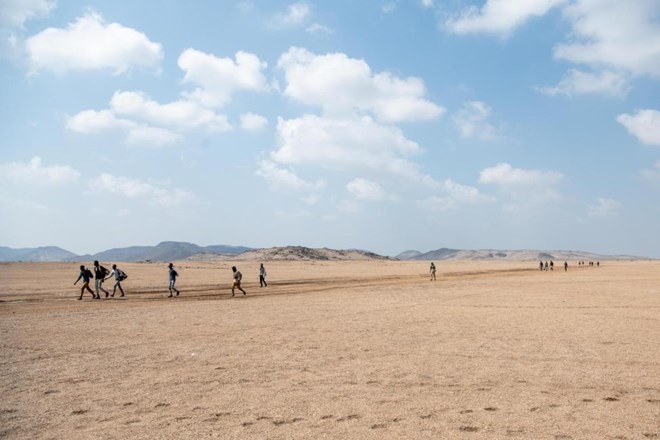Over 1 million migrants in need of assistance in the Horn of Africa: IOM appeals for USD 84 million

Source: UN, IOM Wednesday February 15, 2023

Migrants traversing Djibouti brave the harsh desert terrain often without adequate food and water, during their journeys along the perilous Eastern Route. Photo: IOM 2022
Geneva/Nairobi – The International Organization for Migration (IOM) and 47 other partners are appealing today (14/02) for USD 84 million to provide humanitarian and development assistance to over 1 million migrants and the communities hosting them, many of whom are vulnerable, and in need of urgent help along the Eastern Route from the Horn of Africa to Yemen.
The appeal, made through the multi-agency Regional Migrant Response Plan for the Horn of Africa and Yemen framework, will address the dire humanitarian needs as well as protection risks and vulnerabilities that migrants in the region face and scale up the delivery of lifesaving and resilience-building initiatives as well as pursue the implementation of long-term sustainable solutions for migrants and host communities.
The Eastern Route is one of the busiest, most complex, and dangerous migratory routes in the world. In 2022 overall, the number of migrants who entered Djibouti almost doubled compared to the previous year. In the same year, 89 migrant deaths or disappearances were recorded along the route due to hazardous transportation, illness, harsh environmental conditions, drowning at sea, and violence. Many more deaths and disappearances go unreported.
Every year, thousands of migrants leave their countries in the Horn of Africa and move along the Eastern route towards Gulf countries. In their migration, most migrants make the dangerous crossing of the Red Sea through Bossaso in Somalia, and Djibouti’s coastal town of Obock to Yemen and further by land to Gulf countries.
“The Eastern Route is an underserved crisis easily forgotten amidst other global crises, and we must accord the migrants the support and dignity they deserve,” said IOM Director General, António Vitorino. “The Regional Migrant Response Plan was conceptualized to address the vast and complex challenges on this route and to do so in a coherent and coordinated manner.”
Mobility in the Horn of Africa, through Yemen and to the Gulf States, continues to be triggered by interconnected crises, including persistent insecurity and conflict, harsh climatic conditions, and public health emergencies, in addition to socioeconomic drivers and more traditional seasonal factors.
Funding through this appeal will address the most immediate and critical humanitarian and protection needs of migrants in vulnerable situations; support their voluntary return to their home countries in a safe and dignified manner and ensure that they reintegrate back into their communities successfully.
“The plan provides a flexible mechanism for all stakeholders to respond to evolving migration trends, and broader humanitarian and development challenges affecting migrants, host communities and the respective governments,” added the IOM Director General.
Funding through this appeal will further help stakeholders’ efforts towards addressing the drivers of irregular migration; strengthen the capacity of governments in the region on migration management; ensure coordination of efforts, and enhance inter-state and inter-regional collaboration to address the national and regional dimensions of the migration linking the Horn of Africa and Yemen.
